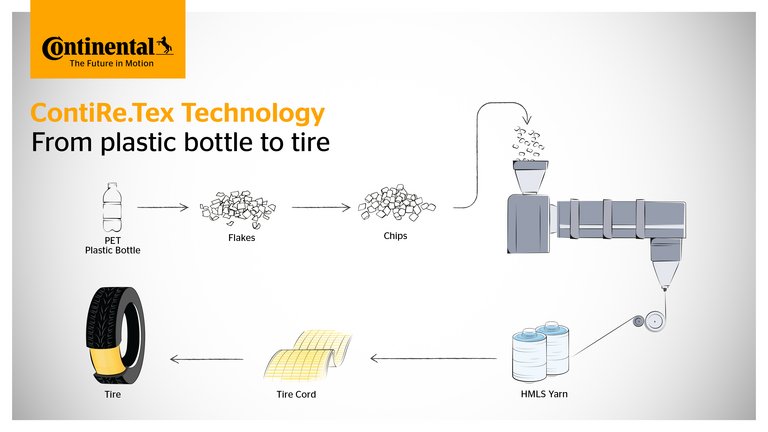Continental is increasing the proportion of recycled materials in its tyres. More plants have recently been converted to use polyester fabric made from recycled polyethene terephthalate (PET) bottles. This increases the recycled content of many tyre lines by an average of three per cent. Depending on the tyre size, up to 15 PET bottles are used per tyre. By replacing the material with recycled polyester fabric, Continental saves valuable resources. Continental presented its own ContiRe.Tex technology for the first time at the end of 2021. It is based on PET bottles that would otherwise not be recycled. These are spun into a polyester yarn without any intermediate chemical steps and can withstand the special stresses in a tyre.
“Reduce, reuse, recycle – this trio is key to more sustainable tyres. Wherever possible, we use recycled materials while maintaining our highest quality standards,” says Jorge Almeida, Head of Sustainability at Continental Tires. “Our polyester yarn made from recycled PET bottles is just as strong as conventional polyester yarn. This shows that sustainability, performance, and safety go hand in hand at Continental.
The innovative ContiRe.Tex technology has been used on a small scale since 2022 at the tyre plants in Lousado, Portugal, and Otrokovice, Czech Republic. The plants in Korbach, Germany, and Sarreguemines, France, have also recently started using recycled PET bottles in series production. The switch to more sustainable materials is an important part of the sustainability strategy of Continental Tires. The tyre manufacturer has set itself the ambition of gradually increasing the proportion of renewable and recycled materials, in a first step to more than 40 per cent by 2030. By then, all new car and light truck tyres will contain only high-performance polyester fibres made from sustainable PET. A conventional passenger tyre today contains about 15 to 20 per cent recycled and renewable materials.
Textile fabrics made from different types of polyester are used in Continental’s tyre production. Their targeted use gives the tyres the desired strength, flexibility and durability. Recycled or renewable PET, with its tensile strength, toughness and temperature stability, is just as stable and suitable for tyre construction as conventional fabric made directly from crude oil. Continental is working intensively on various technologies to ensure that all types of polyester used in tyre production can be converted to sustainable PET by 2030. In addition to recycled PET, the tyre manufacturer is also investigating the use of bio-based or chemically recycled PET.

Continental is working hard to replace as many raw materials as possible with sustainable alternatives in production. By 2030, the tyre manufacturer wants to use more than 40 per cent renewable and recycled materials in its tyres. By 2050 at the latest, all new Continental tires will be made from 100 percent sustainable materials. Step by step, it is already becoming apparent which raw materials will find their way into tyre construction in the future. These include waste products from agriculture – such as the ash from rice husks – rubber from dandelions, recycled rubber or PET bottles.
